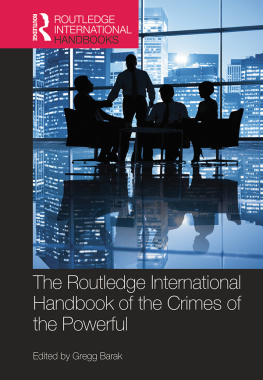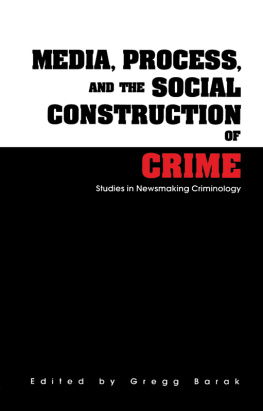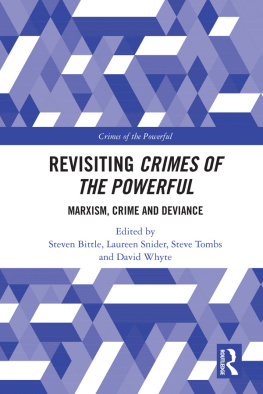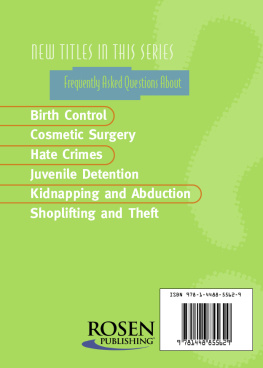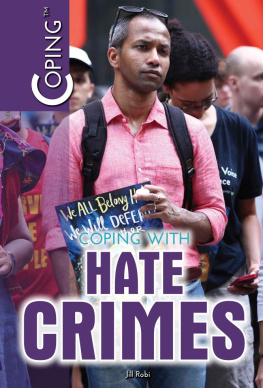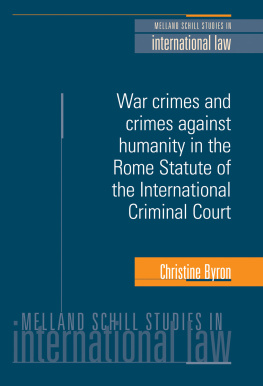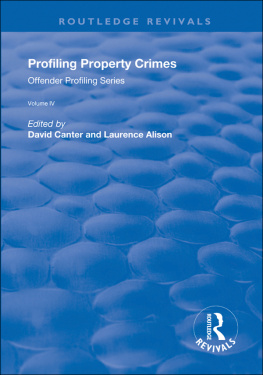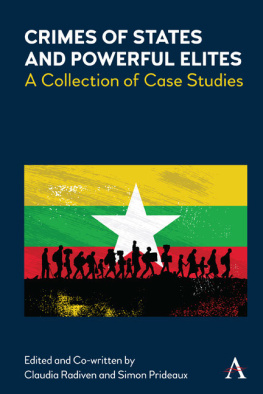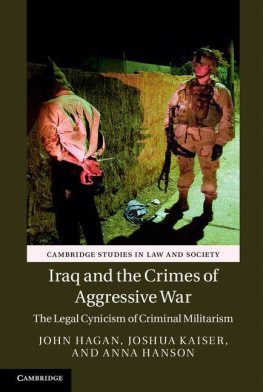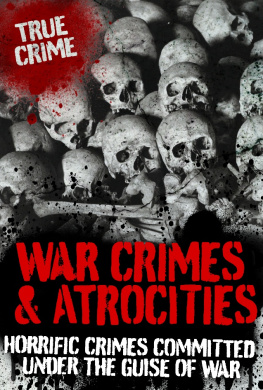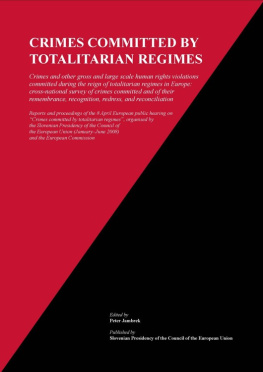Part VIII
State-routinized crimes
Part IX
Failing to control the crimes of the powerful
First published 2015
by Routledge
2 Park Square, Milton Park, Abingdon, Oxon, OX14 4RN
Simultaneously published in the USA and Canada
by Routledge
711 Third Avenue, New York, NY 10017
Routledge is an imprint of the Taylor & Francis Group, an informa business
2015 selection and editorial material, Gregg Barak; individual chapters, the contributors
The right of Gregg Barak to be identified as author of the editorial material, and of the individual authors as authors of their contributions, has been asserted by them in accordance with sections 77 and 78 of the Copyright, Designs and Patents Act 1988.
All rights reserved. No part of this book may be reprinted or reproduced or utilized in any form or by any electronic, mechanical, or other means, now known or hereafter invented, including photocopying and recording, or in any information storage or retrieval system, without permission in writing from the publishers.
British Library Cataloguing in Publication Data
A catalogue record for this book is available from the British Library
Library of Congress Cataloging-in-Publication Data
Routledge international handbook of the crimes of the powerful / edited by
Gregg Barak. First Edition.
1. Organized crime. 2. Political corruption. 3. CorporationsCorrupt
practices. 4. White collar crimes. 5. Power (Social sciences) 6. Elite
(Social sciences) I. Barak, Gregg, editor.
HV6441.R688 2015
364.1dc23
2014045769
ISBN13: 978-0-415-74126-2 (hbk)
ISBN13: 978-1-315-81535-0 (ebk)
Typeset in Bembo
by Apex CoVantage, LLC

With a truly global focus between the contributors and the focus of almost 40 chapters, this book spans five continents Gregg Baraks edited text brims with authority and insight. As the crimes of the powerful are forensically and variously dissected, injustice and anger bubble consistently close to the surface. If this masterful, cutting-edge call for radical change does not help to shift the gaze of criminology upwards as well as down onto the usual suspects, we may as well all give up
Steve Tombs, Professor of Criminology, The Open University, UK
This text explores, with remarkable coverage, dexterity and precision, that most universal and enduring of contradictions in capitalist social orders: How being ripped off, mutilated and killed by a wealthy class of well-dressed people in shiny offices is generally ignored, pardoned and indeed often encouraged by democratic systems of law and justice.
David Whyte, Professor of Socio-legal Studies, University of Liverpool, UK
This is an excellent collection that defines the state of the art in scholarship on state and corporate crime. It is a must-read for graduate students and scholars who have an interest in crimes of the powerful and is sure to make an important contribution to research in this area.
Peter Iadicola, Professor and Chairperson, Department of Sociology, Indiana University Purdue University, USA
Maya Barak is a doctoral candidate in the Department of Justice, Law, and Criminology at American University with a dual concentration in the sociology of law and criminology, and overall emphasis on qualitative methods. Her research brings together the topics of law, deviance, immigration, and power utilizing interdisciplinary approaches that span the fields of Criminology and Criminal Justice, Law and Society, Sociology and Anthropology.
Elizabeth A. Bradshaw is an Assistant Professor of Sociology at Central Michigan University and specializes in the area of state and corporate criminality. She received her PhD in Sociology from Western Michigan University in 2012. Her dissertation examined the causes of the Deepwater Horizon explosion and the ensuing response to the 2010 Gulf of Mexico oil spill as a form of state-corporate environmental crime.
Augustine Brannigan received his doctoral training in Sociology at the University of Toronto, and graduated in 1978. He taught for two years at the University of Western Ontario before joining the faculty of sociology at the University of Calgary in 1979 where he taught criminology, criminal justice, social psychology and social theory until his retirement in 2012. He has appeared as an expert witness in criminal trials cases involving obscenity law and prostitution.
Avi Brisman is an Assistant Professor in the School of Justice Studies at Eastern Kentucky University in Richmond, KY (USA). He has published articles in Contemporary Justice Review, Crime, Law and Social Change, Crime Media Culture, Journal of Contemporary Criminal Justice, Race and Justice, Theoretical Criminology , and Western Criminology Review , among other journals.
Carrie L. Buist is an Assistant Professor of Criminology at the University of North Carolina, Wilmington. She received her PhD from Western Michigan University in Sociology with concentrations in Criminology and Gender and Feminism. Her primary areas of research are women police officers, LGBT issues, gender, feminist theory, and feminist criminology. Her most recent articles have been published in the Journal of Culture, Health & Sexuality (with Emily Lenning), and in the Journal of Crime and Justice (with Susan M. Carlson and Elizabeth A. Bradshaw).
Ronald G. Burns is a Professor in the Department of Criminal Justice at Texas Christian University. His recent books include Policing: A Modular Approach; Critical Issues in Criminal Justice; Multiculturalism in the Criminal Justice System (with R.H. McNamara); and Environmental Law, Crime and Justice: An Introduction (with M.J. Lynch and P.B. Stretesky). His publications focus on policing issues, corporate deviance, and environmental crimes.
Melanie Collard is a researcher at the International State Crime Initiative (ISCI) and also teaches Criminology at the London School of Economics and Birkbeck. She completed her Law Degree at the Universit de Lige, Belgium. She also holds an LLM in Public International Law from Queen Mary University of London and an MA in Criminology and Criminal Justice as well as a PhD in Law & Criminology from Kings College London.
Victoria Ellen Collins is an Assistant Professor in the School of Justice Studies at Eastern Kentucky University. She recently completed her dissertation where she examined the processes involved in creating, implementing, and enforcing policy on maritime piracy. Some of her recent publications have appeared in journals such as International Criminal Law Review, Critical Criminology, Contemporary Justice Review, and The Australian and New Zealand Journal of Criminology .
Marilyn Corsianos is Professor of Criminology and Sociology at Eastern Michigan University. She is the author of The Complexities of Police Corruption: Gender, Identity and Misconduct (Rowman & Littlefield, 2012), the CHOICE Outstanding Academic Title Policing and Gendered Justice (University of Toronto Press, 2009), co-author (with Walter S. DeKeseredy) of Pornography and Violence Against Women (Elsevier, 2015), and co-editor of Interrogating Social Justice (Canadian Scholars Press, 2000).
Mary Dodge is a full Professor at the University of Colorado, Denver in the School of Public Affairs. She earned her PhD in 1997 in Criminology, Law and Society from the School of Social Ecology at the University of California, Irvine. Her articles have appeared in the American Journal of Criminal Justice, Women & Criminal Justice, Contemporary Issues in Criminology, International Journal of the Sociology of Law, and The Prison Journal , among others. Her book, Women and White-collar Crime , was published in 2009.

